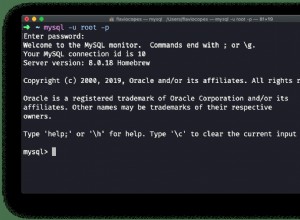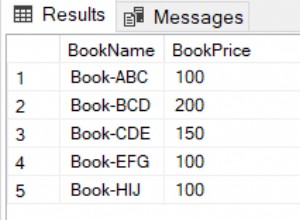Lo siguiente debería funcionar, si los valores son NULL y no están en blanco:
select id,
concat_ws('||', Phone1, Phone2, Phone3)
from t
La referencia está aquí :
Para gestionar los pedidos, optaría por:
select id,
group_concat(phone Separator '||' order by phone) as ConcatPhones
from (select t.id,
(case when nums.n = 1 then phone1
when nums.n = 2 then phone2
when nums.n = 3 then phone3
end) as phone
from t cross join
(select 1 as n union all select 2 union all select 3) nums
) p
where phone is not null
group by id
Esto filtrará cualquier identificación que no tenga un número de teléfono.
También puedes hacer esto con un case gigante declaración, aunque eso parece algo así como una pesadilla:
select t.id,
(case when phone1 < phone2 and phone2 < phone3 then concat_ws('||', phone1, phone2, phone3)
when phone1 < phone3 and phone3 < phone2 then concat_ws('||', phone1, phone3, phone2)
. . . through the remaining 4 permuatiations when all three are present
when phone1 is null and phone2 < phone3 then concat_ws('||', phone2, phone3)
. . . through the remaining 5 permutuations when one is NULL
when phone1 is null and phone2 is null then phone3
. . . through the remaining 2 permutations when two are NULL
end) as ConcatPhones
from t
Esto es más eficiente. Es factible para 3 números de teléfono. No me gustaría tratar con, digamos, cinco de ellos.




